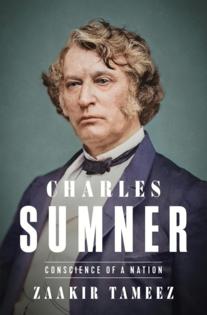Review: That time a politician was caned and almost killed on the Senate floor
Published in Books News
John Adams, a founder of the United States and its second president, privately expressed doubts that the republic would survive its own design flaws. Yet the Constitution, its blueprint, has proved more resilient than just five pages of parchment, despite inflamed schisms and the brutal Civil War.
A key player in that strengthening was abolitionist Charles Sumner (1811-1874), the lanky, leonine senator from Massachusetts best known for his bloody caning at the hands of a pro-slavery Southerner, Preston Brooks. Zaakir Tameez’s sumptuous biography, “Charles Sumner,” captures, in rich detail, a life that connected the Revolutionary generation with the collapse of Reconstruction. Few figures embody these combustible decades as profoundly as Sumner, a nimble thinker whose (probable) homosexuality both confounded him and swung open a door to empathy in a rapidly growing, diversifying nation.
The eldest son of a well-educated, if unambitious, sheriff and his wife, Sumner was raised on Beacon Hill’s humble north slope, Boston’s hub of Black culture at the time. A poor but brilliant interloper amid the city’s elites, he strived to excel, a student of history and languages and a sterling Harvard Law graduate, winning the admiration and affection of Supreme Court Justice Joseph Story.
Although a future as a gentleman scholar beckoned, a trip to Europe convinced him to funnel his prodigious intellect and energies toward ending America’s racial apartheid, lobbying for integration of Boston’s schools over a century before Brown v. Board of Education. His transformation may have been partly personal: He’d developed feelings for his dearest friend, the married Samuel Howe, an intimacy that endured until his death but may have never been consummated.
In 1845, he delivered a Fourth of July stem-winder in which he began to come out as a radical Republican, offending the sensitivities of Brahmins and converting his boredom with the practice of law into a political mission.
“To others, the broke bachelor’s brashness was increasingly seen as a sign of deep moral courage,” Tameez observes. “After his major speech, he began to live by the ethical values of pacifism, abolition, and antiracism openly and proudly. That slowly earned him respect and even admiration across Massachusetts.” Sumner was a pioneer of woke.
He circulated among a who’s who of antebellum writers and activists, such as William Lloyd Garrison, Henry Longfellow, Sojourner Truth, Henry David Thoreau and John Quincy Adams. In 1851, he launched his vaunted Senate career when the Free Soil Party cut a deal for his election. His tenure was punctuated by fiery oratory, Brooks’ attack and a subsequent invalidism that failed to hold him back.
Abraham Lincoln and Frederick Douglass sought his counsel. After the Confederate surrender at Appomattox and a brief, misguided marriage, Sumner committed to a fluid, evolving jurisprudence.
”Sumner argued that the postwar Constitution should be interpreted generously toward human rights,” Tameez notes, then quoting the senator: “‘The Constitution is not mean, stingy, and pettifogging, but open-handed, liberal, and just, inclining always in favor of Freedom.’” He ran afoul of the Ulysses S. Grant administration as the United States knit itself together, refusing to yield on his principles.
Only a year out of Yale Law, the mortifyingly gifted Tameez sees in Sumner the modern birth of the constitutional order. Tameez has crafted a propulsive narrative around a visionary who put his stamp on our social compact. “Charles Sumner” reads like a work from a seasoned biographer rather than a debut — never has a Victorian-era legacy been more vital.
____
Charles Sumner: Conscience of a Nation
By: Zaakir Tameez.
Publisher: Holt, 629 pages.
©2025 The Minnesota Star Tribune. Visit at startribune.com. Distributed by Tribune Content Agency, LLC.













Comments